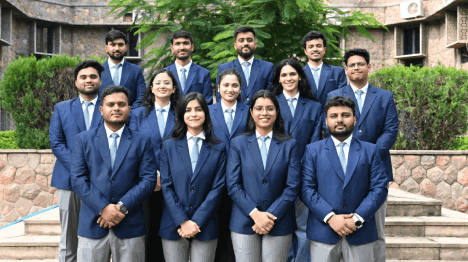- About Us
-
Academics
Schools
Programs
General Information
-
Faculty
The faculty members and researchers working at IIHMR University come from varied backgrounds including, but not limited to medicine, public health, management, economics, statistics, demography, human geography, social and behavioral sciences, rural development and pharmaceuticals.
-
Admissions
- Research
Publications & Journal
- Executive Education
Executive Programmes
- Online Certification Courses
ONLINE CERTIFICATION Courses
- Training
- Placements
- Contact
- Pradanya
- Blog
- Fee Payment
- NAAC
- IQAC
- NIRF
-
About Us
- About IIHMR University
- Board of Management
- Academic Council
- Board of Studies
- Research Board
- Institutional Review Board
- Finance & Audit Committee
- Departmental Research Committee
- Chairperson's Message
- President's Message
- IIHMR University Act
- Infrastructure
- Collaboration
- Ranking
- Board of Studies (School of Digital Health)
- Awards & Accolades
-
Academics
- Institute of Health Management Research
- School of Pharmaceutical Management
- ML Mehta School of Development Studies
- School of Digital Health
- SD Gupta School of Public Health
- MBA (Hospital and Health Management)
- MBA (Pharmaceutical Management)
- MBA (Development Management)
- MBA (Healthcare Analytics)
- Master of Public Health
- Student Manual – Cohort 9 (2021-2023)
- Master of Public Health (Offered by Johns Hopkins Bloomberg School of Public Health, USA in cooperation with IIHMR University, Jaipur, India)
- Ph. D.
- MBA CSR & ESG Management (Executive)
- MBA Sustainable Business Management (Executive)
- Common Information for all the Programs
- Academic Calendar
- Student Handbook 2020-21
- Committees
- Policies
- Annual Exam Calendar
- Library
- Faculty
- Officers of University
- Dean of Institute of Health Management Research
- Dean of School of Pharmaceutical Management
- Dean of School of Development Studies
- Dean of SD Gupta School of Public Health
- Dean of School of Digital Health
- School of Digital Health
- Faculty List A to Z
- Faculty List Designation Wise
- Faculty List School Wise
- Admissions
- Research
- Executive Education
- Training
- Placements
- Alumni
- Events
- Job Openings
- Contact
- Research
Cost-benefit Analysis of Adolescent Health Interventions for Rajasthan
Agency : copenhagen consensus
The total number of adolescents (10-19 years) in Rajasthan is 15.7 million (Census, 2011), which constitutes about 23 percent of the total state population, a potential demographic dividend for the economy. However, there are some key health issues associated with the adolescents that require immediate attention which can otherwise lead to immediate health problems, long term disorders, or poor health later in life and hinder their ability to grow and develop to their full potential. Among others, the key issues affecting the development of adolescents in India as well as Rajasthan include high rate of child marriage, high prevalence of anemia, especially among females and various problems related to mental health.
In this paper, the authors have reviewed the current status and magnitude of these major problems and have also analyzed prospective interventions using cost benefit analysis to address the same in an efficient manner. The analysis reveals that interventions aimed at delaying child marriage through incentives in-kind, preventing anemia among adolescent girls through iron and folic acid supplementation and addressing mental health issues of adolescents in schools through universal screening and providing further treatment after case finding can yield higher benefit per unit of invested cost. The analysis is based on sound secondary evidence in terms of data and other findings and the robustness has been checked.
The study findings show that investment made on delaying child marriage via direct incentives, preventing anemia among adolescent girls, and School based behavioral screening and further mental health services for the adolescents have benefit-cost ratios of 3.4, 9.2, and 1.4 respectively at 5 percent discount rate.



